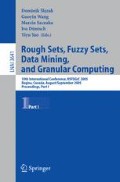Abstract
This paper discusses the degree of granularity and dependence of contingency tables from the viewpoint of linear algebra. From the results of determinantal divisors, it seems that the devisors provide information on the degree of dependencies between the matrix of the whole elements and its submatrices and the increase of the degree of granularity may lead to that of dependence. However, this paper shows that a constraint on the sample size of a contingency table is very strong, which leads to the evaluation formula where the increase of degree of granularity gives the decrease of dependency.
Access this chapter
Tax calculation will be finalised at checkout
Purchases are for personal use only
Preview
Unable to display preview. Download preview PDF.
References
Pawlak, Z.: Rough Sets. Kluwer Academic Publishers, Dordrecht (1991)
Tsumoto, S.: Knowledge discovery in clinical databases and evaluation of discovered knowledge in outpatient clinic. Information Sciences, 125–137 (2000)
Tsumoto, S., Tanaka, H.: Automated discovery of medical expert system rules from clinical databases based on rough sets. In: Proceedings of the Second International Conference on Knowledge Discovery and Data Mining 1996, Palo Alto, pp. 63–69. AAAI Press, Menlo Park (1996)
Tsumoto, S.: Statistical independence as linear independence. In: Skowron, A., Szczuka, M. (eds.) Electronic Notes in Theoretical Computer Science, vol. 82, Elsevier, Amsterdam (2003)
Skowron, A., Grzymala-Busse, J.: From rough set theory to evidence theory. In: Yager, R., Fedrizzi, M., Kacprzyk, J. (eds.) Advances in the Dempster-Shafer Theory of Evidence, pp. 193–236. John Wiley & Sons, New York (1994)
Author information
Authors and Affiliations
Editor information
Editors and Affiliations
Rights and permissions
Copyright information
© 2005 Springer-Verlag Berlin Heidelberg
About this paper
Cite this paper
Tsumoto, S., Hirano, S. (2005). On Degree of Dependence Based on Contingency Matrix. In: Ślęzak, D., Wang, G., Szczuka, M., Düntsch, I., Yao, Y. (eds) Rough Sets, Fuzzy Sets, Data Mining, and Granular Computing. RSFDGrC 2005. Lecture Notes in Computer Science(), vol 3641. Springer, Berlin, Heidelberg. https://doi.org/10.1007/11548669_49
Download citation
DOI: https://doi.org/10.1007/11548669_49
Publisher Name: Springer, Berlin, Heidelberg
Print ISBN: 978-3-540-28653-0
Online ISBN: 978-3-540-31825-5
eBook Packages: Computer ScienceComputer Science (R0)

